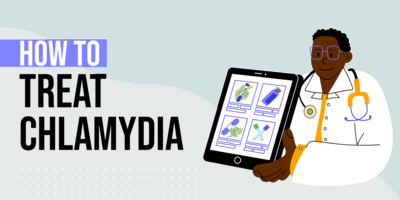
How to Treat Chlamydia
Chlamydia is a bacterial infection that is spread by sexual contact, according to the CDC. It is one of the most...
Read moreHelp patients book appointments with you on Solv. It's free!
13 instant-book locations

Help patients book appointments with you on Solv. It's free!
According to the CDC, sexually active individuals, particularly those with multiple partners, should be tested for chlamydia annually. This is especially important for women under 25, as they are at a higher risk. Men who have sex with men should also be tested regularly, as should pregnant women.
Chlamydia is a common sexually transmitted infection that often goes unnoticed due to its lack of symptoms. However, if left untreated, it can lead to serious health complications, including infertility. By getting tested, you can ensure early detection and treatment, preventing these complications.
There are several urgent care and walk-in clinics in and around Tupelo, MS that offer chlamydia testing. For instance, Urgent Team in Saltillo, MS, is highly rated and known for its short wait times. You can book same-day and next-day testing appointments at these clinics through Solv’s website and mobile app.
Primary care providers are also an excellent resource for chlamydia testing. If you have a trusted primary care provider in Tupelo, consider reaching out to them for testing.
For those without insurance or with limited financial resources, free STD testing is available at various community health centers in Tupelo.
At-home testing kits for chlamydia are another convenient option. These can be ordered online and delivered discreetly to your home.
Tupelo, located in Lee County, MS, has seen a steady increase in chlamydia cases over the years. This trend is in line with national data, which shows a rising prevalence of chlamydia across the United States. Comparatively, nearby counties such as Webster and Fayette have reported lower rates of chlamydia.
Risk factors for chlamydia in Tupelo include having multiple sexual partners, being sexually active at a young age, and not using condoms consistently.
In addition to chlamydia, other STDs such as gonorrhea, HIV, syphilis, and hepatitis are also prevalent in Tupelo. Like chlamydia, these STDs often show no symptoms, making regular testing crucial for sexually active individuals.
Solv has strict sourcing guidelines and relies on peer-reviewed studies, academic research institutions, and medical associations. We avoid using tertiary references.
A chlamydia test is an STD test that can tell you if you have chlamydia or not. According to A chlamydia test is used to determine the presence of chlamydia bacteria in the body, according to the National Institutes of Health. It can be used to confirm whether you have chlamydia even if you don't have any symptoms. According to the National Institutes of Health, chlamydia symptoms include pain when peeing and frequent urination. It can cause abnormal vaginal bleeding in women, and it can cause discharge from the penis in men. the NIH, it can be done as a urine test or a swab test, albeit the swab test is normally only done on women. Many healthcare practitioners that provide lab test services can deliver a chlamydia test.
A chlamydia test is used to identify whether chlamydia bacteria is present in the body, according to the National Institutes of Health. It can be used to determine whether you have chlamydia even if you don't have any symptoms. According to the National Institutes of Health, chlamydia symptoms include pain when peeing and frequent urination. It can cause abnormal vaginal bleeding in women, and it can cause penile discharge in men.
A chlamydia test can reveal whether or not you have the STD and help you avoid infecting others. For sexually active women under the age of 25, males who have intercourse with men, HIV patients, and pregnant women under the age of 25, the National Institutes of Health recommends yearly chlamydia tests. This STD test is particularly recommended for women over the age of 25 who have had multiple sexual partners and whose partners have used condoms incorrectly or inconsistently.
According to the National Institutes of Health, the chlamydia test provider will ask you to urinate into a sterile collecting cup during the urine test. Lab technicians examine your urine sample for the presence of chlamydia bugs. According to the National Institutes of Health, a healthcare provider will use a swab or brush to collect a sample of cells during a pelvic exam. After that, the sample is transported to a laboratory for analysis.
According to the National Institutes of Health, lab test providers may advise women getting a chlamydia test to avoid using vaginal douches or lotions for at least 24 hours prior to the test. It's also possible that men and women will be asked to stop taking antibiotics for at least 24 hours before the STD test.
Symptoms of chlamydia usually show one to three weeks after infection, according to the University of Wisconsin. However, 75 percent of women and 50 percent of men with chlamydia exhibit no symptoms, according to the institution. The only way to find out whether you have chlamydia is to go to an STD testing center and take a chlamydia test. Symptoms of chlamydia usually show one to three weeks after infection, according to the University of Wisconsin. However, 75 percent of women and 50 percent of men with chlamydia exhibit no symptoms, according to the institution. The only way to find out whether you have chlamydia is to go to an STD testing center and take a chlamydia test.
You shouldn't test positive for chlamydia after you've done therapy. According to the University of Rochester Medical Center, chlamydia can be successfully treated with azithromycin or doxycycline. According to the University of Rochester Medical Center, people with lymphogranuloma venereum, a kind of chlamydia, may need 21 days of treatment. Furthermore, the institution recommends that you refrain from all sexual activity for at least seven days or until your chlamydia treatment is finished.
A chlamydia test is available at many healthcare facilities that perform lab tests and STD testing services, such as hospitals, urgent care centers, and walk-in clinics. Solv is one of the simplest and most convenient ways to locate chlamydia test providers in your area. Type "chlamydia test" or "STD testing" into the search field on Solv's website, then enter your location to find top-rated providers and arrange an appointment online.
Annual Wellness Exam in Tupelo
Chickenpox Vaccine in Tupelo
DOT Exam in Tupelo
Ear Wax Removal in Tupelo
Eye Exam in Tupelo
Flu Shot in Tupelo
Hepatitis Vaccine in Tupelo
Measles Vaccine (MMR) in Tupelo
Pap Smear in Tupelo
Physical Exam in Tupelo
Shingles Vaccine in Tupelo
Sinus Infection Treatment in Tupelo
Sports Physicals in Tupelo
Tetanus Shot in Tupelo
Typhoid Vaccine in Tupelo
Well-Woman Exam in Tupelo
Yellow Fever Vaccine in Tupelo
A1C Test in Tupelo
CMP Test in Tupelo
Chlamydia Test in Tupelo
Diabetes Test in Tupelo
Gonorrhea test in Tupelo
H Pylori Test in Tupelo
HIV Test in Tupelo
Hepatitis test in Tupelo
Herpes Test in Tupelo
Mono Test in Tupelo
Pregnancy Test in Tupelo
STD Testing in Tupelo
Strep Test in Tupelo
Syphilis test in Tupelo
TB Test in Tupelo
Thyroid Test in Tupelo
Trichomonas Test in Tupelo
Vitamin D Test in Tupelo
Tips, advice, news—your resource to stay healthy and safe while improving your experience with healthcare providers when you need them.